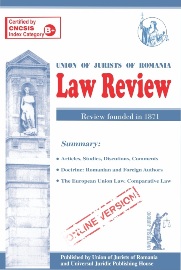- Scientific Life
Access to documentary heritage. What have the Romanian constitutions said for 100 years?
Constitutions address the rights and liberties of the citizens in a state. The right to information, to education, access to culture, the freedom of speech and of the press – they all give substance to the regime of the access to documents/archives. This study aims to analyze through a comparative approach how this regime (based on both the political-social and the cultural-educational functions of the documents) had been determined by the Romanian constitutional provisions over the last hundred years. Providing a transversal perspective of the rights and liberties already mentioned across the six constitutions of Romania: “the most liberal constitution of the epoch” – 1923, the Carlist Constitution - 1938, the three communist constitutions: the first, transitional – 1948, the second, patterned after the Soviet constitution – 1952, the third, socialist – 1965, and, finally, the fundamental act in force – 1991 (amended in 2003) we were able to draw conclusions which emphasize the idea of a direct connection between the level of accessibility to documentary heritage and the political regime established by the constitution, which lays down the range of the rights and liberties. Focusing on the role of the documentary heritage in the process of the fulfillment of a person as an active citizen in society and also on the human level, the study contributes to a theoretical and methodological debate on how the regime of access to documents needs to be in a democratic state.
Volume XIII, issue 1, January-June 2023 2023

Summary
European Union Law
Administrative practices as an infringement of the law of the European Union
Overview on the criminal justice system in Bulgaria. Comparative law. A Bird’s Eye View
The profession of legal advisor in european countries
Legal regime of competition in Slovenia
International Law
Ruscism – A threat to international legal order and the security of all humanity
